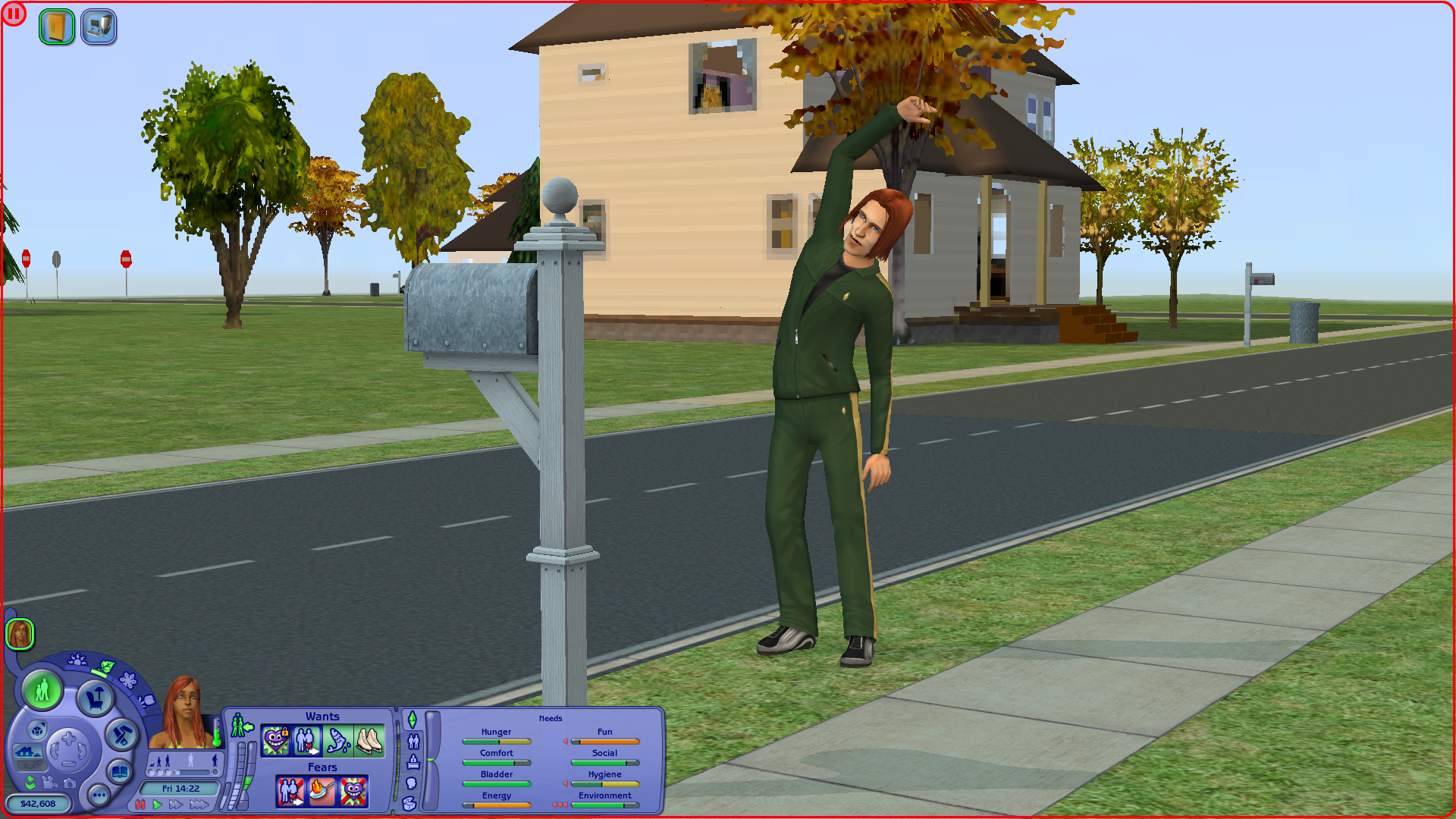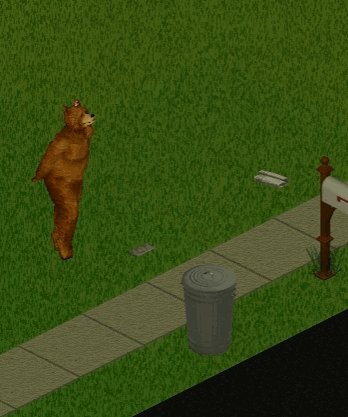Warning: flashing lights in this one, right under the hex map.
Last time, we talked about resolution mechanics, and how roleplaying games typically ascribe an element of chance to them. For tabletop RPGs, this is typically done in the form of dice rolls (though some use decks of cards, which I am very intrigued by more on that some other time), but computerised RPGs--your console games, your PC games--use percentages.
Dice can be represented by percentages, too--there's even percentile die, which are d100s (usually two ten-sided dice; one for single-digits, one for double-digits), but even a humble d20 is a form of percentile die, with each face representing a 5% chance.
So, why am I talking about dice and percentages again? I'm very glad you asked. I'm doing it, because today we're talking about the other randomised element of RPGs--random encounters!
Encounter? I Hardly Know 'er!
When you think of "random encounters", you probably think of one of a few things.
Hexcrawls, in games like Dungeons & Dragons.
A hex map of Barovia--or some of it--from the classic D&D adventure, Curse of Strahd (5th edition version shown).
Or, you might think of random battles in an older JRPG like Pokémon or Final Fantasy.
The Sims, across the franchise, most definitely has random encounters.
I decided to boot up The Sims 2 for these examples, where you've got things like this random dog, who decided to dig up my Sims' yard, or this random jogger who decided to start doing stretches in front of my house (some things never change, shoutout to the random Sims doing pushups everywhere in The Sims 4).
There's also random daily phonecalls:
No, ma'am, Rose is your name, I'm Nina!
I feel Nina's Millennial-ass response in my BONES. Some random woman you spoke to once cold calls you, and wants you to join their MLM? You gotta tell them exactly where to go (the graveyard).
There's also career-based random encounters, in the form of what the Sims community dubs "chance cards".
Look me in the eye and tell me this isn't the kind of scenario you could see a GM offering their player. Look. Me. In. The. Eye.
Now at this point, you're probably saying, "But Dan! You're ignoring the most famous random encounter in The Sims!"
...............Claire the Bear!
...no, I know, you mean the burglar. I love the burglar, too! (And Claire. She rules. That Bear in the Big Blue House-inspired, Hensonesque design is just charming, dangit)
In older Sims games (but not The Sims 4*, boo, hiss), the burglar would randomly appear on your property at some point between midnight and 4am or so, provided all the Sims were asleep. He would then sneak in, and if left to his own devices, steal your stuff, and leave.
*as of the time of writing
Provided you had a burglar alarm, the police would come immediately, and attempt to fight the burglar. If you were quick enough, you could also wake your Sim, rush to a phone, and call the police yourself.
If they won, the police would arrest the burglar.
In The Sims 2, if you were quick enough, you could free the burglar, making a friend (or potentially, a lover) in the process!
...I... was not fast enough.
Yeah, I know how you feel. ACAB, Nina. ACAB.
This is a pretty dynamic random encounter, offering plenty of roleplay opportunities! Physically-inclined Sims can even fight the burglar themselves, saving precious time while waiting for the cops to arrive--or, if you've got a dog, they can attack the burglar! You can make new friends, enemies, and romantic interests, and there's even an opportunity for a bit of mischief--what the Sims team internally calls "deviant" gameplay. This is your classic "start a fire on purpose and delete the doors, make your Sims go swimming and delete the pool ladders, be the bad guy" kind of playstyle.
How to Turn This Into an RPG
Random encounters are pretty easy. You assign each encounter a percentage value, and some kind of trigger. For Pokémon (or at least, pre-generation 9), this is done by walking in long grass. For Final Fantasy (or at least, pre-FFXIV), this is by walking pretty much anywhere on the overworld. For a tabletop game, this is done by rolling a dice every X amount of hours travelled.
If you're using a hex map (like the one from Curse of Strahd, way up at the top of this entry), you can abstract this further. Each hex (a hexagonal zone on a map) represents a certain measure of distance, which can be translated into hours travelled on foot.
For a Sims-inspired RPG, there is no "travel" (at least, not to the degree that a party of adventurers might experience), but "hours"? Hours, I can do.
Every X amount of hours lived, the GM rolls some dice and consults a table. Something happens, according to where they are. For example, at home, a commuter walks past on their way to the bus stop, somebody campaigning for city council knocks on your door, a dog walker and a dog stroll by, or, if it's the dead of night, a burglar appears.
They don't have to be world-shattering events. But there should be room to tell a story out of them. That burglar might have stolen a priceless family heirloom--one that you have to get back at all costs, giving you a quest hook, leading you to pawn shops all over town, and potentially to the burglar's home, where it turns out they barely have enough money to buy food, and that necklace they hocked was the only way to feed their kids. Suddenly, that necklace doesn't seem so important--or maybe your player character doesn't care, and calls the police, forcing the kids into the foster system. These sorts of encounters give your players something to do once the encounter ends. It gives them goals. It gives them tough, moral choices to make.
It gives you what you might call "quest hooks".
A longstanding complaint I have with D&D random encounters, especially those in prewritten adventure modules, is that they presume that you're playing a more old-school, episodic campaign, instead of the long-form narratives that have become more popular in 5th Edition with the rise of actual plays like Critical Role and Dimension 20. There's seldom story-focused encounters in these tables--at the most, you might get a vignette of something going on in the world, but it's up to you if you want to make them part of a larger narrative.
A random encounter table, as seen in Xanathar's Guide to Everything.
Surely a very expensive book can do better than suggest "1d3 kobolds" if I roll an 18! I could've come up with that myself!
There's a couple of thematic encounters here, with the intention of building a story out of them. Who ate that mammoth? What happened to the footprints in the snow? Who are the tribal warriors? What are they hunting? But for the most part, there's a bear. Some mephits. Some orcs. A half-ogre. Cannon fodder.
You probably could craft a story out of these cannon fodder encounters, but that doesn't seem to be the design intent. The design intent, as best I can glean, is that each week you'll have a self-contained, episodic encounter. You fought a bear this week, and next week you'll fight some orcs. A skilled DM would be able to expand the story potential, maybe saying that the bear is caught in a trap, and if you free it, a powerful fey that guards the forest might grant you a boon--or perhaps, the orcs are acquaintances of your Dwarven Ranger, and you can trade cooking supplies with them!
"Whaddya MEAN these encounters are boring!?"
But overall, that puts a lot of pressure on the GM to come up with an entire new plot element, on the fly. I feel a better use of random encounters would be if they all came with a connection to the world at large by default. Not everything has to be world-shattering, but yeah. Maybe instead of "some orcs", they're "some orc merchants who live deeper in the dungeon". Maybe instead of "some mephits", it's "some mephits, summoned by a Wizard who was expelled from a local mage's guild".
Now there's some quest hooks! Your players know that if they delve deeper into the dungeon, they'll encounter an orc village, where they can rest up for the night--safe from monster attacks. They know there's a mage's guild in the world, and if they seek out membership, they might be granted access to scrolls that the party Wizard can use to learn new spells. These sorts of encounters give the players a goal.
And I think goals are important in random encounters.
Which brings us to next time, on Nobody Poops on Television: Worldbuilding and quests!
















Comments
Post a Comment